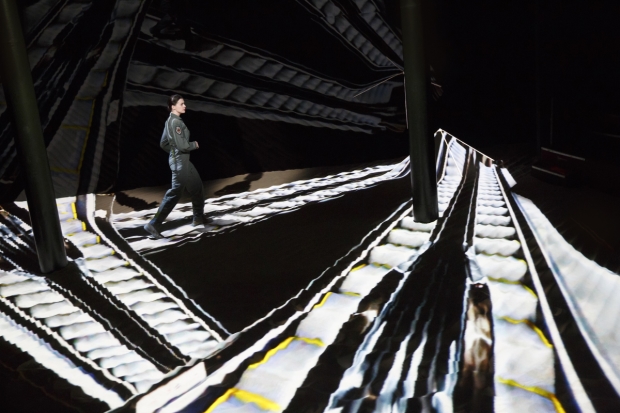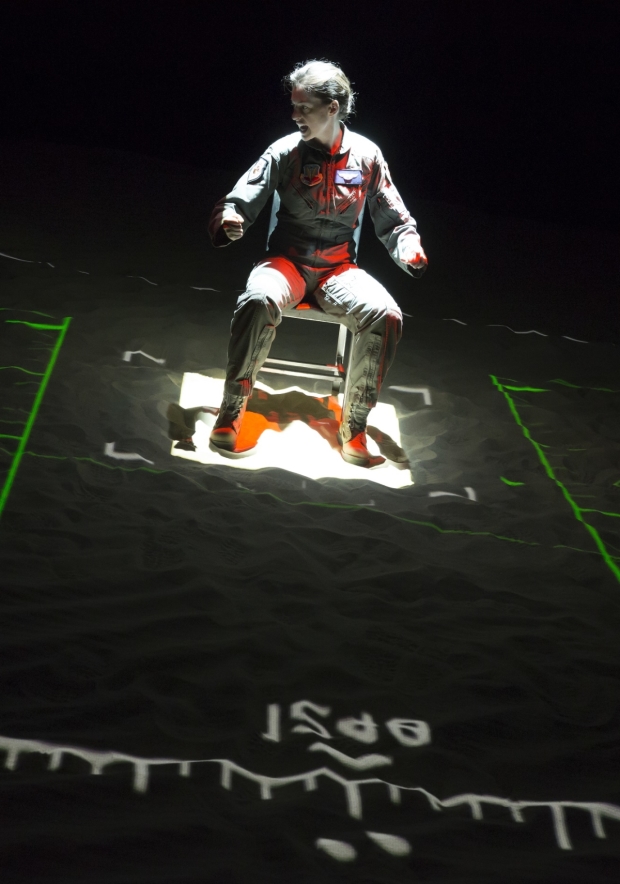Grounded

(© Joan Marcus)
“Don’t speak to a god of guilt,” says the Pilot, referring to herself, in George Brant provocative solo play Grounded. “This god isn’t interested okay? This god wants a beer.” That’s the kind of hubris that makes for good theater. But Brant’s gripping play, now running at Public Theater, offers much more than that, with its trenchant comments about war, the way we wage it now, and the inhuman toll that carnage takes on those who experience it. Grounded ran last year at Walkerspace in a spare yet galvanizing staging, directed by Ken Rus Schmoll, that starred Hannah Cabell. In the Public’s new production, director Julie Taymor takes the play in a new direction, projecting startling images based on Brant’s highly evocative, savagely poetic language to further illuminate the story of the Pilot, played with chilling ferocity by Anne Hathaway.
The story follows an unnamed female Air Force pilot who feels most at ease wearing her flight suit and either pounding back a few brews with the boys or sailing through the blue sky in her F-16 fighter, Tiger. She has been bombing the hell out of the “guilty” in the Middle East without ever having to witness the horrific results of her job. After she meets and marries Las Vegas casino blackjack dealer Eric, she goes on maternity leave to give birth to their daughter, Sam. When the Pilot returns to work, she discovers that Tiger has been retired, and she’s been reassigned to the “chair force,” where she’ll operate drones in the safety of a remote Nevada facility.

(© Joan Marcus)
At first, the Pilot hates trading the blue sky for a gray screen, but soon she sees her monitor as a divine eye with the power to judge and destroy. As she shuttles between her roles as a wife and mother at night and as a destructive god of wrath during the day, the lines between the war and her home begin to blur and her grip on what is real begins to disintegrate.
Taymor has taken Brant’s brilliant script and added to it a stunning visual dimension that illustrates the increasingly splintered, somewhat dreamlike nature of the Pilot’s reality. Riccardo Hernandez’s set, a desert in miniature, situates the Pilot directly in the sort of landscape that she might bomb. The ominous opening scene, in which the Pilot stands beneath a portentous stream of sand that falls on her helmet from above, engagingly suggests that the Pilot, trapped in an hourglass, is in a race with time.
A bevy of projections, designed by Peter Nigrini, ratchet up the tension, made even more pronounced by the huge mirror-wall behind the stage, where we see reflected the chilling gray screen — the “eye in the sky” — and the “military age males” whom the Pilot destroys. Sound designer Will Pickens’ explosions add to the terror. Mundane, confining images of parking spaces, the long road home, and innumerable blocks of light (designed by Christopher Akerlind) allow us to see the Pilot’s world closing in on her. A surreal, Escheresque image of escalators in a shopping mall also cues us in to the her altered mental landscape while she is with her daughter, and perhaps also provides evidence of post-traumatic stress disorder. The safe confines of the “chair force” can’t protect her mind from the sight of flying body parts and heaps of dead comrades — horrors she never witnessed from her F-16.
Hathaway soars as the Pilot. With tightly pulled-back hair and a no-nonsense Southern accent, she convincingly conveys the aggressive, chest-thumping bravado of a warrior. Later, she becomes a menacing, vengeful god as she makes her first kill from her chair. We see the tension build in Hathaway’s Pilot until she finally seeks release from her stress, shouting at the top of her lungs as shards of splintered light shower around her and AC/DC thunders in the background. The moment is as cathartic for the audience as it is for the Pilot.
On occasion, a projection feels gratuitous, as when the Pilot and Eric move to Sin City and we see a burst of neon lights and hear Elvis sing “Viva Las Vegas.” But otherwise, Taymor’s direction enriches Hathaway’s performance as well as Brant’s text and makes for one of the most spectacular solo shows you’re likely to see. This Grounded takes off like a rocket.











